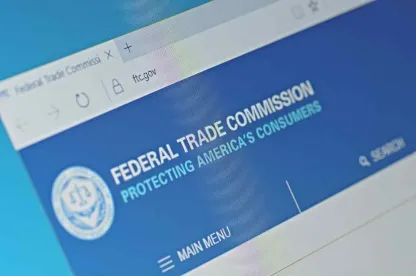The Federal Trade Commission (“FTC”) announced Monday that it had reversed its in-house Administrative Law Judge’s (“ALJ”) Initial Decision dismissing a complaint brought by FTC staff against Illumina, Inc.’s acquisition of GRAIL, Inc. The Commission, in a 4-0 vote, found that the acquisition violated Section 7 of the Clayton Act and ordered Illumina to divest Grail. Illumina will likely appeal this decision to the court of appeals.
The FTC sued to block the transaction in March 2021 through its in-house administrative process. The Commission has discretion to initiate a complaint to block a transaction in its in-house tribunal by delegating its authority to the ALJ regarding the initial performance of statutory fact-finding functions and initial rulings on conclusions of law. The attorneys prosecuting the case on behalf of the Commission are referred to as “Complaint Counsel.”
ALJ Michael Chappell released the Initial Decision in September 2022. The Commission has the authority to review the factual findings, legal conclusions, and discretionary decisions of its in-house ALJ de novo because the Commission initially delegated its authority to the in-house tribunal.
The Commission’s decision to reverse the ALJ’s Initial Decision is accompanied by an Order requiring Illumina to divest the maker of non-invasive, early detection liquid biopsy tests which can screen for multiple types of cancer (“multi-cancer early detection tests” or “MCED”).
Illumina founded GRAIL but spun the company off in 2017. GRAIL’s MCED tests have the ability to diagnose cancer before it becomes too late to treat, but no firm has yet successfully commercialized MCED tests. The theory of harm alleged against this vertical merger was primarily that Illumina is “currently, and for the reasonably foreseeable future will remain, the only viable supplier of a critical input: NGS platforms necessary for MCED tests” and that Illumina would be able to foreclose competitors of GRAIL from the market as several firms race towards commercialization of MCED tests.[1]
The ALJ had previously found that Complaint Counsel had the burden of showing that the anticompetitive harm from the merger was sufficiently probable and imminent.[2] The Commission decision overturning the ALJ was unanimous, and a concurring opinion was issued by departing Commissioner Christine Wilson. The Commission’s 101 page opinion finds that FTC Complaint Counsel made out a prima facie case of illegality in showing that the acquisition may substantially lessen competition.
Additionally, the opinion finds that the merging parties failed to rebut that showing via their asserted defenses of entry, merger efficiencies, and the “Open Offer.”[3] The parties’ open offer was a behavioral remedy which committed Illumina to not increase the price of its sequencing instruments and consumables to GRAIL’s competitors, to decrease the cost of Illumina’s highest-throughput instrument, and to offer the sequencing products at the same pricing as it does to GRAIL for a period of 12 years.[4]
Chair Khan’s opinion found that Illumina has strong financial incentives to undermine GRAIL’s rivals and rejected the adequacy of the proposed behavioral remedies, noting that: “The multiple gaps and flaws of the Open Offer show precisely why structural remedies are preferred over behavioral remedies.”[5] While some federal courts have recently accepted behavioral remedies as a fix to anticompetitive concerns posed by mergers, the Commission’s rejection of such remedies in favor of structural remedies certainly mirrors the antitrust enforcement agencies’ documented position on the issue.
Commissioner Wilson issued a parting concurrence, where she agrees with the Commission’s conclusions, but declined to sign on to two points of analysis in the opinion.[6] Commissioner Wilson did not join the Commission’s use of the Brown Shoe factors in evaluating a vertical merger noting that the standard “which elevates the role of market share, has been abandoned by the courts and the enforcement agencies” for good reason.[7] Commissioner Wilson also did not join the Commission Opinion’s treatment of the Open Offer with respect to the conclusion that the Open Offer would be appropriately addressed at the remedy stage after a finding of liability, rather than as part of the parties’ rebuttal case. Commissioner Wilson did agree that Complaint Counsel does not bear the burden as part of its prima facie case of showing that the Open Offer does not “ameliorate the anticompetitive effects of the transaction.”[8]
The Commission’s opinion finds that the acquisition may substantially lessen competition in the market for the research, development, and commercialization of MCED tests.[9] Additionally, the opinion finds that the parties’ proposed efficiencies are “unverified, not merger-specific and, to the extent they might somehow come to pass, not likely to benefit the public.”[10] The opinion also rejects a number of constitutional claims raised by the parties.
The Final Order entered by the Commission requires Illumina to divest GRAIL within 180 days. The Opinion and Order will become final unless the parties file a petition for review in a federal Court of Appeals within 60 days from date of service of the Order.[11]
The opinion squarely presents the hotly debated question as to where a proposed “fix” fits into the merger review analysis and whether the burden with respect to proposed remedies lies with the government to show that the proposed remedy would not absolve the anticompetitive concerns of the transaction or with the merging parties to show that the proposed fix outweighs the anticompetitive effects of the merger after the government has successfully put on a prima facie case.
Additionally, the opinion is significant as it finds for Complaint Counsel on a vertical theory of harm in a nascent market and relies partially on the 60-year old Brown Shoe “practical indicia” in defining the relevant antitrust market for the research, development, and commercialization of MCED tests. The FTC has recently taken the position that it can rely on the Brown Shoe practical indicia in defining a relevant antitrust market following the Commission’s loss in its challenge to the Meta-Within acquisition.
Illumina faces additional scrutiny in the EU in the form of an expected “gun jumping” fine for closing the transaction prior to official approval from the EU merger control system. The European Commission issued a statement of objections in December 2022 which also call for divestiture of Illumina’s repurchase of GRAIL. The EC is also expected to issue a divestment decision soon.
The Opinion and Order by the FTC foreshadows the Agency’s current thinking on vertical merger enforcement and gives a “quick look” into what might change in the forthcoming revisions of the Merger Guidelines, which have historically been used to help aid and persuade federal courts in merger challenges.
The FTC rescinded its approval of the short-lived 2020 Vertical Merger Guidelines in September 2021 but has yet to release its initial draft of revised merger guidelines—which the heads of both antitrust enforcement agencies have hinted will revisit the traditional distinctions between horizontal and vertical transactions.[12] The proposed new merger guidelines are expected to be released this year.
FOOTNOTES
[1] Opinion of the Commission in the Matter of Illumina, Inc., and GRAIL, Inc., at 42, FTC Docket No. 9401 (Mar. 31, 2023), available here.
[2] Initial Decision in the Matter of Illumina, Inc., and GRAIL, Inc., at 194, FTC Docket No. 9401 (Sept. 09, 2022), available here.
[3] Opinion of the Commission, supra note 01, at 93.
[4] Id. at 20.
[5] Id. at 73.
[6] Concurring Opinion of Commissioner Christine S. Wilson in in the Matter of Illumina, Inc., and GRAIL, Inc., at 42, FTC Docket No. 9401 (Mar. 31, 2023), available here.
[7] Id. at 2.
[8] Id. at 3
[9] Opinion of the Commission, supra note 01, at 25.
[10] Id. at 76.
[11] See FTC Orders Illumina to Divest Cancer Detection Test Maker GRAIL to Protect Competition in Life-Saving Technology Market, FTC Press Release (Apr. 03, 2023), available here.
[12] Federal Trade Commission and Justice Department Seek to Strengthen Enforcement Against Illegal Mergers, FTC Press Release (Jan. 18, 2022), available here.





 />i
/>i

